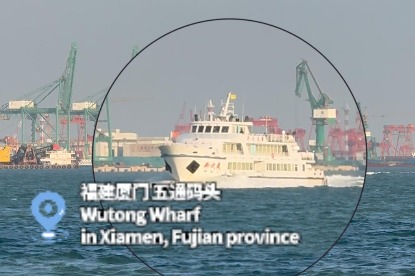Xiaomi unveils first EV model
By MA SI | China Daily | Updated: 2023-12-29 08:57

Sedan SU7 comes in two versions with high-tech; firm to pursue grand auto goal
Chinese tech company Xiaomi Corp finally took the veil off its much-anticipated first electric vehicle on Thursday.
The move is expected to intensify the competition in China's crowded new energy vehicle market where established automakers, startups and tech companies are all vying to expand their presence, experts said.
"We aim to become one of the world's Top 5 automakers via hard work over the next 15 to 20 years" to rival Porsche and Tesla, said Lei Jun, founder and CEO of Xiaomi.
At the company's auto-tech event in Beijing, he disclosed that the sedan, labeled the SU7, is the result of hard work and investment of lots of resources to develop key technologies like electrical machinery over the past three years.
In November, a website of the Ministry of Industry and Information Technology disclosed the specifications of the SU7, a smooth four-door, five-seater saloon. Nearly 5 meters long, it comes in two versions, one with lidar and the other without.
Unlike many Chinese tech companies that debuted with SUVs, which are very popular in China, Xiaomi opted for a sedan because "it is more difficult to make sedans, which can better represent the spirit of the automobile industry", Lei said.
He further said the SU7 has cutting-edge autonomous driving capabilities and is equipped with an operating system that can connect with Xiaomi's smartphones, Pads and other electronic devices.
The SU7 is still several months away from market launch, he said. Xiaomi did not disclose the price of the SU7.
Some media reports indicated that Xiaomi-branded cars will likely be produced by a unit of State-owned automaker BAIC Group at a Beijing factory with an annual capacity of 200,000 vehicles. But Xiaomi did not confirm this speculation.
It has, however, pledged to invest $10 billion in autos over the next decade for a firm foothold in China's highly competitive NEV market.
Zhang Yongwei, vice-president and secretary-general of China EV 100, a major auto think tank in the country, said, "Next year will see more intense competition in the EV industry, with a more differentiated market landscape."
The next two years will be very crucial, Zhang said, as companies that may not have the necessary competence will likely exit the market after a shakeout.
"The production volume and sales of new energy vehicles in China are expected to reach 13 million units in 2024, with a year-on-year growth rate of about 40 percent," Zhang said.
Roy Lu, a Shanghai-based automotive analyst, said Lei has for long been seeing automobiles as part of Xiaomi's AI-enabled internet of things or IoT ecosystem. That is why, he, in his personal capacity as an investor, has invested in Chinese EV startups such as Nio and Xpeng Motors, Lu said.
But Lu also warned that the change in Lei's role from an investor to a competitor will push Nio and Xpeng Motors to brace for impact of Xiaomi's EV foray on their business.
Experts said whether or not Xiaomi can really afford the capital and time needed for the cash-intensive smart car business remains to be seen, given that several Chinese companies that had entered the segment faced severe financial difficulties. Some of them have even gone bankrupt.
On Thursday, Xiaomi's shares slid marginally in Hong Kong to HK$16.28 ($2.08).
masi@chinadaily.com.cn
























